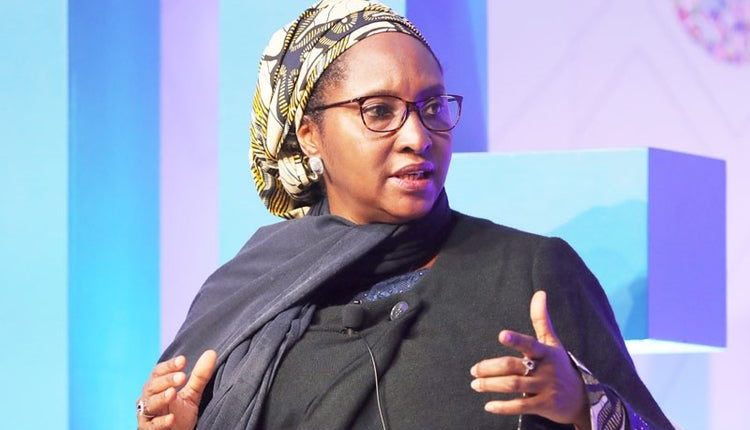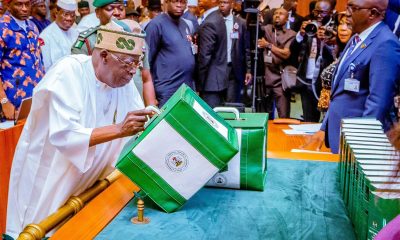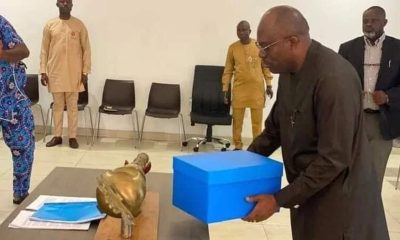Business
Zainab Ahmed: Falling oil revenue, petrol subsidy affecting full implementation of 2022 budget

Zainab Ahmed, minister of finance, budget and national planning, says oil revenue shortfall and petrol subsidy deductions are challenging the full implementation of the 2022 budget.
Ahmed said this on Wednesday when she appeared at the house of representatives committee on finance to present the performance of the 2022 budget.
She said the achievement of the nation’s revenue target has been adversely impacted by the decline in the oil revenue target.
In August, the Central Bank of Nigeria (CBN) said the country generated N799.10 billion from oil sector in the first quarter of 2022. The figure represented a 28.3 percent decline from N1.11 trillion in the fourth quarter of 2021.
While oil revenue amounted to N799 billion in three months, TheCable reported that petrol subsidy payments gulped N675 billion same period.
Presenting the 2022 budget performance on Wednesday, Ahmed said the federal government is taking measures to improve the country’s revenue.
“The full implementation of the 2022 budget is challenged particularly by oil revenues that are falling target at 27.1 percent as of August. Crude oil production challenges and PMS subsidy deductions by the NNPC constitute a significant threat to the achievement of our revenue growth target as seen in the oil and gas performance 2022 as of August,” the finance minister said.
READ ALSO:
- Oyetola releases N377m gratuity to retired teachers
- Canada, Australia Raise Fresh Alarm Over Likely Terrorist Attack In Abuja
- Terror alert: US to evacuate citizens, embassy staff
“Revenue generation remains the major fiscal constraint of the federation. The systemic resource mobilisation problem has been compounded by recent economic recessions we have witnessed, one during the first term of this administration in 2016, and the most recent one in 2020. But effort has mainly focused on improving tax administration and collection.
“The finance act 2020 that pegs the revenue to expenditure ratio of the government own enterprises at 50:50 has helped us greatly in ramping up revenues from the government-owned enterprises and the fact can be seen in the performance of the GOEs revenue of 1.3 trillion as of 2021.
“We are also putting effort into improving non-oil taxes and this is showing in the result of the performance of the non-oil target showing clearly that the non-oil revenues are performing below target and in fact, the non-oil revenues are now over 70 percent of the revenue performance of the federal government budget.”
Fielding questions from the lawmakers on what the federal government is doing to address inflation in the country, Ahmed said President Muhammadu Buhari has authorised the national food security council to meet and generate solutions to address the high cost of food prices.
She explained that the high cost of diesel was contributing to high prices of food.
“In Nigeria, we also have inflation and one of the buckets of inflation is food inflation. This can be seen in the high cost of energy and diesel,” Ahmed said.
“We find this showing up in food prices. Prices are going up because diesel prices are high. So when farmers produce their goods and they have to transport the goods to the market. The NBS data shows that food prices have actually declined but the cost of production is continuously increasing and impacting the cost of goods and unfortunately affecting our people.
“From the monetary side, what the CBN is doing is continuing to manage inflation by monetary tightening and by mopping up liquidity.
“On the side of the government, the president has authorised the national food security council and we have held meetings — even yesterday — on how some support will be provided.
“One of the means will be releasing stocks from the strategic reserves but also looking at how to provide some support in form of input in fertilizer production as well as input.”
The minister added that the food security council, will “in the next couple of days” provide recommendations to the president that will, later on, be announced for implementation.
Railway
Lagos Rail Mass Transit part of FG free train ride – NRC

Lagos Rail Mass Transit part of FG free train ride – NRC
The Nigerian Railway Corporation (NRC) has disclosed that the Lagos Rail Mass Transit (LRMT) trains are included in the Federal Government’s free train ride initiative for the Christmas and New Year celebrations.
The LRMT, which currently includes the Phase 1 Blue Line Rail and the Phase 1 of the Red Line Rail, operates under the Lagos Metropolitan Area Transport Authority (LAMATA).
This announcement was made by Ben Iloanusi, the Acting Managing Director of the NRC, during an interview on NTA News TV on Friday, following the launch of the initiative earlier that day.
While Iloanusi stated that Phase 1 of both the Blue Line and Red Line Rail projects are part of the program, LAMATA has yet to confirm this inclusion.
READ ALSO:
- Nigeria denies alleged plot to destabilise Niger Republic
- Navy arrests 19 Nigerians attempting to reach Europe by hiding on ship
- Troops arrest four Ambazonian rebels in Taraba
Iloanusi outlined the other routes benefiting from the scheme, which include the Lagos-Ibadan Train Service, Kaduna-Abuja Train Service, Warri-Itakpe Train Service, Port Harcourt-Aba Train Service, and the Bola Ahmed Tinubu Mass Transit in Lagos. Notably, little was previously known about the Bola Ahmed Tinubu Mass Transit service until this disclosure.
“Let me mention the routes where this free train service is happening. We have the Lagos-Ibadan Train Service, we have the Kaduna-Abuja Train Service, we have the Warri-Itakpe Train Service, we have the Lagos Rail Mass Transit trains, we have the Port Harcourt-Aba Train Service, and we have what we call the Bola Ahmed Tinubu Mass Transit, which is also in Lagos,” he stated.
Iloanusi provided operational updates, stating that passengers nationwide can access free tickets online or, for those unable to do so, at train stations where they will be profiled and validated.
He noted that passengers using NRC-managed services (excluding the Lagos Rail Mass Transit) should reserve tickets via the official website, www.nrc.gov.ng, with a valid ID required. He also advised travelers to plan, arrive on time, and bring valid identification.
Lagos Rail Mass Transit part of FG free train ride – NRC
Business
NNPC denies claim of Port Harcourt refinery shutdown

NNPC denies claim of Port Harcourt refinery shutdown
The Nigerian National Petroleum Company Limited (NNPCL) has denied claims in media reports that the newly refurbished Port Harcourt refinery has shut down.
The national oil company denied the claim in a press release issued by its Chief Corporate Communications Officer, Olufemi Soneye, on Saturday.
Soneye said the claim was false and urged Nigerians to disregard it. He stressed that the Port-Harcourt Refinery is fully operational.
READ ALSO:
- Like Ibadan, stampede claim 10 lives for Abuja Catholic church, 17 in Anambra
- Marketers react after NNPCL slashes petrol price to N899 per litre
- Electricity: We installed 184,507 meters, issued 50 licences in Q3, says FG
The statement read, “The attention of the Nigerian National Petroleum Company Limited (NNPC Ltd.) has been drawn to reports in a section of the media alleging that the Old Port Harcourt Refinery which was re-streamed two months ago has been shut down.
“We wish to clarify that such reports are totally false as the refinery is fully operational as verified a few days ago by former Group Managing Directors of NNPC.”
He noted that preparation for the day’s loading operation is currently ongoing, and added that claims of the shutdown are “figments of the imagination of those who want to create artificial scarcity and rip-off Nigerians.”
NNPC denies claim of Port Harcourt refinery shutdown
Business
CBN permits BDCs to buy up to $25,000 FX weekly from NFEM

CBN permits BDCs to buy up to $25,000 FX weekly from NFEM
The Central Bank of Nigeria (CBN) has granted Bureau de Change (BDC) operators temporary permission to purchase up to $25,000 weekly in foreign exchange (FX) from the Nigerian Foreign Exchange Market (NFEM).
The Central Bank of Nigeria (CBN) has granted Bureau de Change (BDC) operators temporary permission to purchase up to $25,000 weekly in foreign exchange (FX) from the Nigerian Foreign Exchange Market (NFEM).
This move, detailed in a circular dated December 19, 2024, is designed to meet seasonal retail demand for FX during the holiday period.
The circular was signed by T.G. Allu, on behalf of the Acting Director of the Trade and Exchange Department.
The arrangement will be in effect from December 19, 2024, to January 30, 2025.
Under the directive, BDCs may purchase FX from a single Authorized Dealer of their choice, provided they fully fund their accounts before accessing the market.
Transactions to occur at the prevailing NFEM rate
The transactions will occur at the prevailing NFEM rate, and BDCs are required to adhere to a maximum 1% spread when pricing FX for retail end-users.
READ ALSO:
- Badenoch’s negative portrayal of Nigeria Police unfair-PCRC
- Bitcoin price crashes to $95,000 as market continues to react to Federal rate cuts
- Bauchi high court dismisses blasphemy, cybercrime charges against Rhoda Jatau
All transactions conducted under this scheme must be reported to the CBN’s Trade and Exchange Department.
The circular read in part:
“In order to meet expected seasonal demand for foreign exchange, the CBN is allowing a temporary access for all existing BDCs to the NFEM for the purchase of FX from Authorised Dealers, subject to a weekly cap of USD 25,000.00 (Twenty-five thousand dollars only).
This window will be open between December 19, 2024 to January 30, 2025.
“BDC operators can purchase FX under this arrangement from only one Authorized Dealer of their choice and will be required to fully fund their account before accessing the market at the prevailing NFEM rate. All transactions with BDCs should be reported to the Trade and Exchange department, and a maximum spread of 1% is allowed on the pricing offered by BDCs to retail end-users.”
The CBN assured the general public that PTA (Personal Travel Allowance) and BTA (Business Travel Allowance) remain available through banks for legitimate travel and business needs.”
These transactions are to be conducted at “market-determined exchange rates” within the NFEM framework.
This initiative reflects the CBN’s strategy to stabilize the FX market and manage seasonal surges in demand.
CBN permits BDCs to buy up to $25,000 FX weekly from NFEM
-

 Railway1 day ago
Railway1 day agoLagos Rail Mass Transit part of FG free train ride – NRC
-

 metro12 hours ago
metro12 hours agoWhy we displayed ‘Jesus Christ is not God’ banner at Lekki mosque -Imam
-

 metro2 days ago
metro2 days agoCourt stops customs from seizing imported rice in open market
-

 metro3 days ago
metro3 days agoIbadan stampede: Tinubu orders probe as death toll hits 40
-

 metro2 days ago
metro2 days agoIbadan stampede: Ooni reacts after arrest of ex-wife
-

 metro1 day ago
metro1 day agoNIMC warns against extortion, reaffirms free NIN enrollment
-

 metro2 days ago
metro2 days agoAfe Babalola: Court grants Dele Farotimi bail, barred from media interviews
-

 News3 days ago
News3 days agoAdebayo Ogunlesi, 2 other Nigerians make Forbes 50 wealthiest Black Americans list 2024









